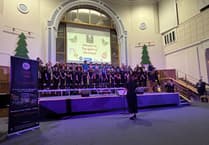Considering he is such a prolific author, it’s hard to accept the notion that writing is as arduous a process for Michael Morpurgo as it is for mere mortals who make a similar living, however tenuous the comparison may be.
“It’s never effortless, that would certainly be a confusion,” he insists.
“Luck has followed me in my writing, but when it comes down to actually sitting down and dreaming up a book, I’m just like a bad school boy – I tend to put off work all the time! In the end, I get fed up with myself if I don’t write.
“(But) when I’m not locked into a story I can be like a bear with a sore back– that’s a good motivation as well.”
Morpurgo may have turned 80 recently, but he is just as busy as ever.
Much of his focus lately has been on the animated adaptation of his novel Kensuke’s Kingdom, which recently premiered at the BFI London Film Festival, but he has also launched a new book recounting his 10 favourite Shakespeare tales.
Now in his twilight years, he also has time to reflect on the impact his work has had on millions of readers across the globe and the reasons why he became so successful.
“Everything that’s contributed to the richness of my life has not been by intent. I’ve been extraordinarily lucky with the people, the teachers, I have met at certain times in my life.”
He recalls he never wanted to become a writer when he was young. His ambition had been to play rugby for England, and although he went to university, he downplays his academic achievements.
“If I told a newspaper what my A-level grades were, I’d never sell a book again! I was not a scholar and I was never going to head academia.”
He half-heartedly decided to join the army, prompted by a desire to forge friendships rather than a longing to fight for Queen and Country.
He left after about a year. The experience, though short, nonetheless changed him “enormously” as it was the first time he broke out from the comfort and safety of middle-class family life.
“I was with these soldiers who came from the meanest streets of our country, so it was extremely broadening for me. A lot of the smugness and over self-confidence vanished in that time.”
His brief time in the army forced him to re-evaluate his life as he “didn’t like the idea of fighting wars”. Meeting his future wife only helped to reinforce that decision.
War left an indelible mark on the young Morpurgo, nonetheless. Many of his relatives served in the army during World War Two. One of his uncles was killed at the age of 21 while serving in the RAF, while another one was parachuted into France to fight with the Resistance.
But if his themes of humanity, compassion and companionship are timeless, they are often smothered by the noise of war. More so now, just as the Middle East is threatening to explode and the conflict in Ukraine drags on with predictable ferocity.
“In the end, if the world is to sort itself out and retain some kind of sanity there has to be some kind of understanding that we don’t fight to sort out our problems,” he says wearily. “The suffering is too great.”
But if war appears to be the easy, go-to solution to conflict these days, his response to the causes and the possible solutions is more refreshing.
“What is happening more and more is that people shout and don’t listen – and that applies to people on the street and politicians. Education is the only way these things are going to change,” he says firmly.
“People use religion, nationality and the ownership of land as the excuse for wanting to kill someone else. In the end, they will get round the table and talk, so they might as well do it sooner than later. The more we talk, the more we find that we have more things in common.”
He recalls a visit to a primary school in Israel where both Jews and Arabs are allowed to attend – the only one in the country. The experience inspired him to write a story about children flying kites together and sending conciliatory messages over the wall that divides the two communities.
If you had to choose one book out of his extensive bibliography, it would be War Horse, the moving tale of Joey, a Devon farm horse that is sold to the cavalry during World War One.
Despite an initially muted response by critics in 1982, the novel later projected him internationally, thanks in part to the massively successful 2007 stage adaptation at the National Theatre.
The play was eventually seen by more than seven million people in 11 countries. But that was only the beginning.
In 2011 came Spielberg’s film adaptation, which garnered an even bigger audience, although Morpurgo’s feelings about the movie are lukewarm to say the least.
“It was not necessarily my favourite film. When I met Steven Spielberg I gave him two or three books of photographs by James Ravilious, who was a great chronicler of agricultural and pastoral life in Devon before the First World War. I wanted him to capture the difficulty of what it was like to farm this difficult, wet land.
“I thought he would find an old farmstead, of which there are plenty here, but (instead) he went to Dartmoor because he liked the big skies and built his own Hollywood thatched cottage, but it looked fake.”
On the upside, since War Horse and Private Peaceful, he has become far more involved in stage and film adapations of his work, and he believes Kensuke’s Kingdom is one of the best, yet.
“It’s something quite extraordinary in every aspect. It caught the spirit of the book, and to my slight irritation I know it’s better than the book.”
His wife Clare can be heard chipping in disapprovingly in the background, prompting a teasing remark from the author. It provides a glimpse, not only of marital bliss, but of the successful partnership that founded a charity in 1976 close to their home in the village of Iddesleigh, helping under-privileged inner-city children to re-connect with nature and animals.
His links to Devon and Cornwall go back a long way. He had a house in Zennor in Cornwall during the late 70s and 80s that was once also the home of D.H. Lawrence.
He enthuses about his forthcoming talk at the Dartington Trust (“I love walking into that courtyard”) and is re-energised at the thought that he’ll be meeting readers in person, some of whom will now be in their 50s, having read his books when they were children.
“Each of them will have made of the books exactly what they want. My words are a code, really.
“They interpret the code and bring their life experience to it – and I love that.”
Michael Morpurgo will be giving a chat in the Great Hall, Dartington Trust, on November 25 at 8pm





Comments
This article has no comments yet. Be the first to leave a comment.